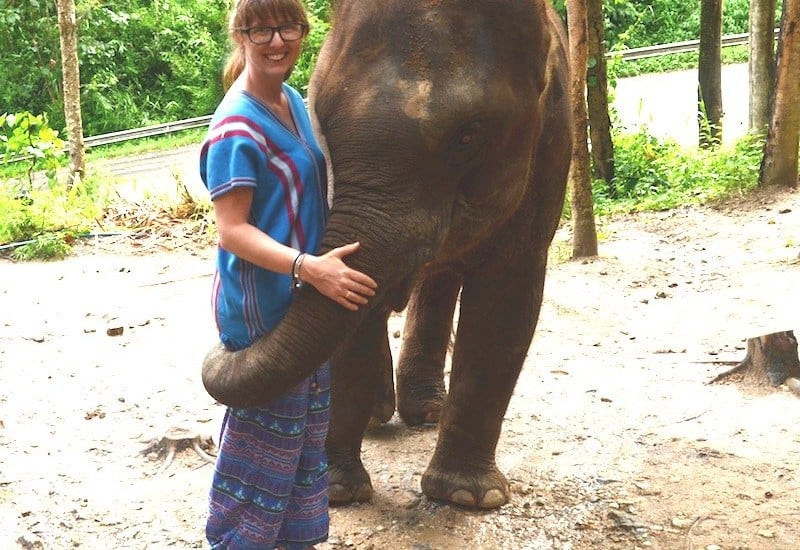Elephants have long since been my favourite animals. I am not sure what attracts me to them but I know my first teddy was an Elephant called Ellie and I still have him 23 years on. For those heading to Southeast Asia the opportunity to meet one of these majestic gentle giants is often quite high up the MUST DO bucket list.
High levels of demand to have contact with an elephant has created a so-called “Elephant Tourism” industry and it is not always clear cut whether this is a good or bad thing.
Now we know that what upsets people the most is the controversial methods that have been used to “tame” and “break-in” these beautiful creatures in order to order ride them. Elephants have long been used like horses and water buffalo in manual labour tasks. In fact, did you know most of the Elephants in Thailand come from the now illegal logging industry and were used as a form of transportation?
What about the elephants in captivity?
Asian elephants like the ones in Thailand and Laos are an endangered species and their population continues to decline. Due to the loss of their habitat (ironically through the illegal logging trade that they were used in) it is thought to be impossible to release all of the captive elephants held in Thailand back into the wild.
Whilst research shows that unlike other animals they are likely to survive and adapt back to the wild and the general consensus is that there is just not enough of their natural habitat left to house them all.
What’s being done about elephant experiences?
Recently a number of elephant sanctuaries have been established to take care of elephants rescued from circuses or “elephant tourism” and from logging. In the cases where the elephants have been rescued from logging operations, their owners (Mahouts) and their families were 100% dependant on them for their economic survival so now many Mahouts are leasing their elephants to conservation organisations in preference to working them in the illegal logging industry which is an indication of their affection for their elephants and also offers their families ongoing economic support. It’s good for the elephants and good for the community!
Elephant tourism has long attracted people to Thailand because of the unique opportunity to interact with these creatures. But can we combine this with ethical considerations and make this sustainable and beneficial for these animals?
When you arrive in Thailand, Chiang Mai in particular, there are hundreds of places offering you a “unique elephant experience”. From here the onus is on you to do some research and choose what one you should ethically support. Whilst these Elephant sanctuary’s/parks will evoke a loving, caring mission to protect mistreated elephants rescued from the tourism and logging industry, it’s extremely difficult to establish how legitimate their propaganda is. (How do we know that they are telling the truth?)
Approved & recommended elephant experiences
Luckily, Stray has done some of the hard work for you and recommends the following Elephant Experiences that have met their criteria.
- Elephant Nature Park, Chiang Mai: This is often booked out so be sure to plan your visit in advance if you want to get up and close with some Elephants. More info about this nature park.
- Elephant Jungle Sanctuary, Chiang Mai: This is a suggested alternative if Elephant Nature Park is booked up. More info about the Jungle Sanctuary.
- Elephant Conservation Centre, Xayabouri, Laos: Located 3 hours from Luang Prabang you would need to hop off the bus if you wanted to spend some time here, however, it is a full-scale conservation project with an international veterinary team. They allow you to stay onsite and become involved in the project as a volunteer. If this is something you are interested in you can arrange this with the company themselves and it truly is an off the beaten track experience. More info about this elephant conservation centre.
You could ask how is it possible to look after them in captivity at all without exploiting them in some way which would be a fair question. But also, without tourism and people speaking out about this topic there would be a lack of funds to care for these wonderful animals.
The threat of extinction would be even higher due to the rampant destruction of their habitat by logging and palm oil companies. We just need to learn as travellers/tourists to ask the right questions, do some research and realise that we do vote with our tourist dollars and that this is a powerful thing.

By seeking out places that try to promote the care and wellbeing of these animals and provide better practices, these places are having to adapt and change to be able to attract the new “conscious” travellers. It is important to increase awareness and promote sustainable elephant-friendly tourism which is able to offer a balance between the needs of tourists, elephants, mahouts and their families.
At the end of the day, ethics is determined by morals. And everyone will have different morals of what they judge to be right and wrong and the limits on this. I just hope that you will reflect, do some research and consider where maybe the best place to see these beautiful creatures.
Rebecca Mussenden graduated from law school and then decided to put down the books and travel the world. Over the course of 4 months, Rebecca Strayed with us in Myanmar, Thailand, Laos, Cambodia, Vietnam and New Zealand – everywhere you can Stray, she Strayed!! Now she has the travel bug bad. America and South America are next on the list!

